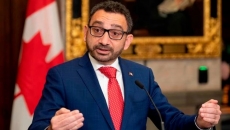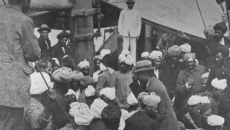It will take another three years for Canada to make good on its commitment to grow a multinational NATO battle group in Latvia to a combat-ready brigade, Prime Minister Justin Trudeau revealed Monday.
As part of Operation REASSURANCE, these @CanadianForces members are currently deployed at Camp Ādaži in Latvia. They play an essential role in @NATO’s deterrence and defence efforts – and they do so with real strength and bravery. Over lunch today, we made sure to thank them. pic.twitter.com/6eGcMOmX03
— Justin Trudeau (@JustinTrudeau) July 10, 2023
The two countries have signed a "road map" outlining the process.
It began more than a year ago, when Canada pledged to increase the size and capability of the battle group as part of NATO's efforts to reinforce its eastern flank and respond to Russia's invasion of Ukraine.
The document sets out three phases for the work, which will eventually involve as many as 2,200 persistently deployed Canadian troops plus the ability to add hundreds of additional Armed Forces members as needed. It states that brigade buildup will be completed in 2025, and that Latvia will work to build new infrastructure.
"By 2026, Canada will complete the full implementation of persistently deployed brigade capabilities to Latvia," the document says.
Trudeau held a joint press conference with Latvian Prime Minister Krišjānis Kariņš at the Ādaži military base outside Riga on Monday, where he also greeted some of the 800 Canadian Armed Forces members currently deployed to the mission.
He noted that the plans to grow Canada's presence at Ādaži will exceed its current capacity, which is already strained. The base is a mix of permanent buildings, temporary shelters, tents and shipping containers.
Trudeau, who also met with Latvian President Edgars Rinkēvičs earlier in the day, said the additional personnel will reinforce and enhance Canadian land, maritime and air capabilities and support special operations in central and eastern Europe.
"This is the way forward in modern defence," he said. "Almost a dozen countries from across NATO are co-operating, training and working alongside each other and learning valuable lessons from each other that make our collective defence stronger."
Carleton University professor Stephen Saideman said Canada has just enough troops to ramp up the mission in Latvia, in part because Ottawa is not sending soldiers in large numbers to other places such as Haiti.
"It's going to mean that everybody in the army is going to be going to Latvia every couple of years — and we already have people who have done two or three tours in Latvia," he said.
Saideman said the Latvian base doesn't have much ammunition for training exercises because so much has been sent to Ukraine, and he argued this could make it difficult to keep soldiers from leaving the forces.
"What they need to do in some ways is make that mission desirable and enjoyable, so that it becomes a recruitment pitch and retention pitch — as opposed to, 'Oh no, we're doing the same thing all over again.' Because people in the military want to keep on doing interesting things."
Saideman added that troops in Latvia seem well-resourced, based on his contacts and a visit he made to the base in early June. A CBC News report at that time suggested soldiers were buying their own helmets, but Saideman said the issue appeared based on a preference for newer gear that Canada has been slow to procure, as opposed to a lack of critical kit.
Trudeau also promised that Canada would procure and pre-position critical weapon systems and help with intelligence and cyberactivities. In all, $2.6 billion has been set aside, including a $1.4-billion commitment made in the 2022 federal budget.
"Canada and all countries must be clear that Russia's unprovoked war on an independent country, on a free and democratic Ukraine, is a threat to freedom, international law, human rights and the whole set of shared democratic values that generations of soldiers have fought to defend," said Trudeau.
Last month, Defence Minister Anita Anand announced that a Leopard 2 battle tank squadron with 15 tanks and about 130 personnel would join the mission starting this fall. Canada has also pledged to buy air defence and coastal defence systems for the mission.
The NATO alliance has doubled the number of battle groups in the region since the war in Ukraine began, adding them to four countries.
Germany recently pledged to station a full brigade of its own in Lithuania, where it leads another battle group. The United States and United Kingdom have completed NATO exercises to show they can quickly scale up to brigade strength.
Saideman said Canada's deployment in Latvia puts it on the same footing as allies with much larger militaries and international sway.
"Given that Russia is a threat to the rules-based international order, this is probably the place where we can make the biggest difference in preventing Russia from making it worse," he said of the Latvia mission.
Saideman, who is director of the Canadian Defence and Security Network, said he was perplexed that Ottawa is only pledging a three-year extension, as he expects Russia will remain a security threat for Baltic states like Latvia for years to come.
On Monday afternoon, Trudeau arrived in Vilnius, the capital of neighbouring Lithuania, as NATO leaders gather there for an annual summit that begins on Tuesday.
Canada and several other countries will be under pressure to increase their defence spending, as allies discuss making the current two per cent of GDP target a new minimum spend.
They will also debate eventual NATO membership for Ukraine, and whether the military alliance will extend an interim security guarantee. Trudeau supports eventual NATO membership for Ukraine.
Lithuanian Prime Minister Ingrida Šimonytė said at a joint press conference that Ukraine needs some sort of protection.
"We need to integrate Ukraine into the Euro-Atlantic security architecture faster," she told reporters Monday through an interpreter.
"Only by removing the grey zones, we can end the vicious cycle of Russian wars in Ukraine, in Europe."






